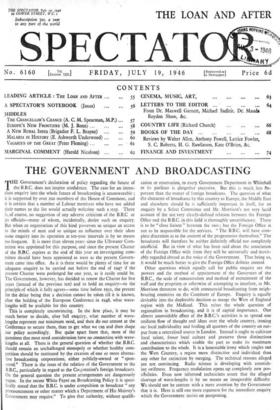THE GOVERNMENT AND BROADCASTING
THE Government's declaration of policy regarding the future of the B.B.C. does not inspire confidence. The case for an imme- diate enquiry into the whole future of broadcasting is unanswerable ; it is supported by over 200 members of the House of Commons, and it is certain that a number of Labour members who have not added their names to the list would actually welaime such a step. There is, of course, no suggestion of any adverse criticism of the B.B.C. or its officials—many of whom, incidentally, desire such an enquiry. But when an organisation of this kind possesses so unique an access to the minds of men and so unique an influence over their ideas some enquiry into its operation at ten-year intervals is by no means too frequent. It is more than eleven years since the Ullswater Com- mittee was appointed for this purpose, and since the present Charter of the B.ItC. expires at the end of this year an investigating com- mittee should have been appointed as soon as the present Govern- ment came into office. As it is there would be plenty of time for an adequate enquiry to be carried out before the end of 1947 if the present Charter were prolonged for one year, as it easily could be. The Government, however, has decided to renew the Charter for five years (instead of the previous ten) and to hold an enquiry—to the principle of which it fully agrees—some time before 1951, the pretext for the delay being that a decision cannot be taken till it is known, after the holding of the European Conference in 1948, what wave- lengths will be available for this country.
This is completely unconvincing. In the first place, it may be much better to decide, after full enquiry, what number of wave- lengths represent our minimum need, and then do our utmost at the Conference to secure them, than to get what we can and then shape our policy accordingly. But quite apart from that, most of the questions that most need consideration have no connection with wave- lengths at all. There is the general question of whether the B.B.C. should remain an unchallenged monopoly or whether healthy com- petition should be instituted by the creation of one or more alterna- tive broadcasting corporations, either publicly-owned or " spon- sored." There is the issue of the relation of the Government to the B.B.C., particularly in regard to the Corporation's foreign broadcasts. On the general question the present arrangements are dangerously vague. In the recent White Paper on Broadcasting Policy it is speci- fically stated that the B.B.C. is under compulsion to broadcast " any pronouncement or other matter which a Department of His Majesty's Government may require." To give that authority, without qualifi- cation or reservation, to every Government Department in Whitehall or its purlieus is altogether excessive. But this is much less itn- portant than the matter of foreign broadcasts. The question of what the character of broadcasts by this country to Europe, the Middle East and elsewhere should be is sufficiently important in itself, for an enquiry by a Select Committee and Mr. Morrison's not very lucid account of the not very clearly-defined relation between the Foreign Office and the BB.C. in this field is thoroughly unsatisfactory. There is to be " close liaison " between the two ; but the Foreign Office is not to be responsible for the services. "The B.B.C. will have com- plete discretion as to the content of the programmes themselves." The broadcasts will therefore be neither definitely official nor completely unofficial. But in view of what has been said about the association of the Foreign Office with them they will be universally and inevit- ably regarded abroad as the voice of the Government. That being so, it would be much better to give the Foreign Office definite control.
Other questions which equally call for public enquiry are the powers and the method of appointment of the Governors of the B.B.C., the scale of remuneration and method of recruitment of the staff and the propriety or otherwise of attempting to interfere, as Mr. Morrison threatens to do, with commercial broadcasting from neigh- bouring countries on the Continent of Europe. Enquiry is equally desirable into the deplorable decision to merge the West of England region with the Midland. This raises the whole question of regionalism in broadcasting, and it is of capital importance. One almost unavoidable effect of the B.B.C.'s activities is to spread one uniform flow of thought and ideas over the whole country, ironing out local individuality and feeding all quarters of the country on out- put from a centralised source in London. Instead it ought to cultivate local talent, foster local culture and preserve those distinctions and characteristics which enable the part to make its maximum contribution to the whole. It is a lamentable irony which singles out the West Country, a region more distinctive and individual than any other for extinction by merging. The technical reasons alleged are not. convincing. Radio science is developing with astonish- ing swiftness. Frequency modulation opens up completely new pos- sibilities. Even now informed technicians assert that the alleged shortage of wave-lengths is by no means an insuperable difficulty. We should not be content with a mere assertion by the Government that it is. Here is still one more argument for the immediate enquiry which the Government insists on postponing.


























